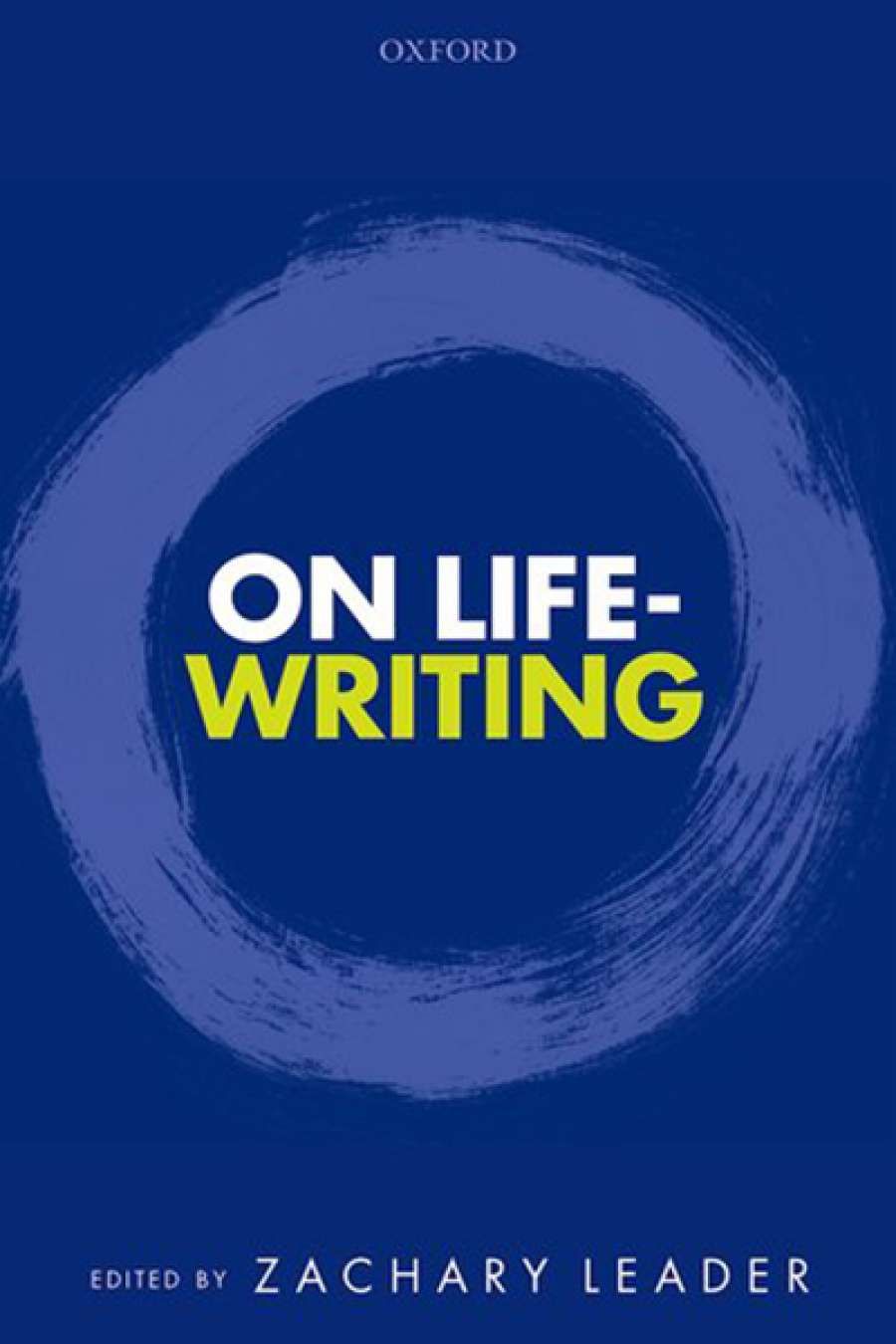
- Free Article: No
- Contents Category: Biography
- Custom Article Title: Richard Freadman reviews 'On Life-Writing' edited by Zachary Leader
- Review Article: Yes
- Online Only: No
- Book 1 Title: On Life-Writing
- Book 1 Biblio: Oxford University Press, $50.95 hb, 336 pp, 9780198704065
In 'Prosopography and Crowded Attention in Old and New Media', Alison Booth moves the volume's focus to the complex issue of plural life representations (prosopography being a collection of short lives within one volume) and to a nuanced consideration of issues of gender in earlier and current life writing. In his stylish if somewhat circuitous essay, 'Writing Real People', Adam Foulds argues that in life writing of whatever kind, the body is 'the one ungainsayable reality of a person's life'. In 'Rosamund and Ravelstein: The Discandying of a Creator's Confection', Janis Freedman Bellow, widow of Saul, writes fascinatingly about her experience of being a model for a fictional creation – Rosamund in Bellow's novel Ravelstein (2000): of her shifting sense of identification with the character, and the ironic aftermath which sees her unable to exercise the creative powers that Rosamund herself was able to liberate.
The volume moves back to ostensibly non-fictional modes of life writing in Hermione Lee's '''From Memory": Literary Encounters and Life-Writing', an essay which combines judicious generalisations about life writing and a path-finding discussion of a sub-genre she calls literary 'encounter narratives', in which writers relate their meetings with famous literary figures. Another contribution which focuses on gender, specifically the writing of women's lives, is Karen A. Winstead's 'Medieval Life-Writing and the Strange Case of Margery Kempe of Lynn (c.1373–c.1440)', which makes a persuasive case for The Book of Margery Kempe as an audacious 'experiment in life-writing' whose transgressive qualities can resonate with twenty-first-century readers.
Alan Stewart's 'The Materiality of Early Modern Life-Writing: The Case of Richard Stonley' focuses on diaries. Stonley, an Elizabethan exchequer, kept a diary which contains the first record of the purchase of a book by Shakespeare. Stewart provides a detailed analysis of Stonley's diaristic strategies and of their relationship to his strikingly compartmentalised identity.
Joyce E. Chaplin's 'The Autobiographies of Benjamin Franklin' invites us to reconceptualise Franklin's stolid classic as a constituent part of a larger, more heterogeneous and proto-modern first-person work which expresses Franklin's various identities, not least that of the scientist – an 'auto-experimenter', as she interestingly points out, who used first-person narrative to report bodily sensations occasioned by his own experiments. Blake Morrison, a fine memoirist himself, writes in praise of confessional memoir's tendency to defy propriety. His informative 'The Worst Thing I Ever Did: The Contemporary Confessional Memoir' is the most stylistically relaxed and informal essay in the volume. J. David Velleman recounts aspects of his Holocaust family history in 'The Rights to a Life', his discussion of Helen Fremont's After Long Silence (1999), while providing On Life-Writing with its most detailed consideration of the ethics of life-writing. Patrick Hayes's engaged and engaging essay on the pros and cons of online life-writing, 'Human 2.0? Life-Writing in the Digital Age', provides a valuable survey of relevant issues but – refreshingly – declines to come down definitively on either side of the argument. Laura Marcus's 'Autobiography and Psychoanalysis' spotlights another life-writing sub-genre – the psychoanalytically mediated autobiography. She expertly surveys key issues, especially the relationship between therapeutic narrative and 'autobiography proper', and her reading of Richard Wollheim's stunning memoir, Germs (2004), is perhaps the finest piece of textual commentary in the collection.
 Zachary Leader (photograph by John Haynes)
Zachary Leader (photograph by John Haynes)
Leader astutely leaves the most radical essay until last: in 'The Unstoried Life', analytic philosopher,Galen Strawson restates his objection to the view of 'narrativists' (as he terms them) that 'all human life is life-writing, and that life-writing is not only a necessary task for any self-respecting human being, but also, at least in the best case, an exercise of autonomy – self-determination'. His engagingly tendentious piece makes the case for 'non-narratives' – people like him – who do not fundamentally experience life or the self as narrative unities, whether (ostensibly) scripted from without or within.
Of course one is left with questions: whether definitions of the field might not begin with (say) the individual life as the foundational unit of expression and analysis, and then build more systematically than does Leader's strikingly vague formulation; what status the notion of 'choice' has in St Clair's Marxist-semiological reading; how reader response and embodiment aspects relate in Foulds's discussion; what thresholds, if any, might apply to the application of the term 'life writing' in the instances of scientific writing Chaplin refers to; since most life-writing students and scholars who have encountered critiques of the 'narrativist' position have done so through Derrida et al., might it have been helpful for Strawson, who has written widely about Continental philosophy, to situate his discussion in this familiar terrain of life-writing studies?
Still, the 'sampling' offered in On Life-Writing makes a nuanced and welcome, though not I think a decisive, contribution to life-writing studies.


Comments powered by CComment